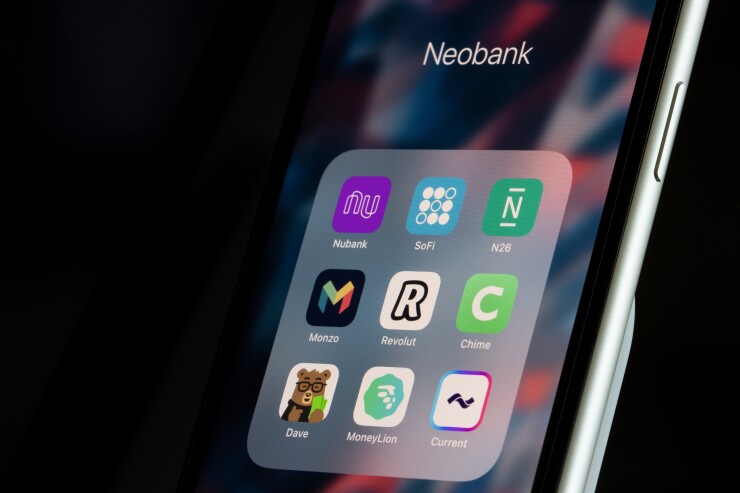
Neobanks are often seen as a nimbler option for people to handle their banking needs, but they gain that agility, in part, by operating efficiently and with less expense. Using artificial intelligence to assist employees and complete redundant work could be key, said leaders in the industry.
Fintech firms have typically led financial institutions when it comes to adopting emerging technologies, but as generative and advanced AI becomes more commonplace,
"Frankly, a lot of their [workforce] challenges and opportunities aren't going to really be that different from a traditional bank," Roche said. "The fact is, AI is going to eliminate jobs that perform redundant tasks … I think the promise of AI is that while there may be less redundant positions doing redundant work, those positions that remain are going to be more interesting."
In a survey of banks and fintechs conducted by Arizent, American Banker's parent company, about
Neobank Dave debuted DaveGPT, a generative AI-based chatbot, in December. CEO Jason Wilk said, though, that the company has been mindful of its hiring, and while it plans to maximize efficiency of its staff, doesn't plan to cut workers. He added that moving forward, AI can be an enhancer so the company doesn't have to hire as many new employees to accomplish the same roles.
"There have been a lot of questions around whether or not neobanks can get profitable," Wilk said. "I think this is a key lever that we all have to really get the most operating leverage out of the business to further prove that profitability."
As economic factors have compressed margins at many financial institutions, neobanks have cut staff. Oportun, Upstart and LendingClub have all reduced their headcounts in the last year in efforts to operate more efficiently and cheaply.
Dave employs about 300 folks full time, not including its hefty chunk of outsourced talent and contractors, and has about 9 million registered users. The Los Angeles company has been guiding toward profitability for the last few quarters.
The AI Dave uses for underwriting, which the company has been building and refining since its launch in 2017, is primarily homegrown, but advanced AI opportunities are being developed through partnerships with external entities. Dave has recently begun using
DaveGPT should resolve 75% of customer inquiries by the end of the year, up from its previous automated chatbot's resolution rate of 50%, Wilk said. He added that Dave has begun to view customer support as a product that can be improved with advanced AI.
With the growing interest in generative AI, it seems inevitable that some banking jobs will change while others will be eliminated entirely.
"Customer support is quite expensive," Wilk said. "For us to provide a great experience that's getting people to their resolution quickly and efficiently, without having to talk to someone, just really helps us continue on that differentiation between us and major banks — the ability to scale without needing a lot of people at this company."
Roche added that it's too early to tell how many roles will be impacted by AI, but "redundant jobs are going to get eliminated." He said customer service, marketing and cybersecurity are top-of-mind for financial institutions when thinking about where AI can take over or enhance work from humans.
"I don't think anybody is thinking that there will be an utter replacement of particular positions by AI. I think there's a reason Microsoft named their AI tool copilot," Roche said. "I think if you look at what's different about the challenger banks, it's that their model relies much more on lower non-interest expense than traditional banks' model does. So there's certainly an urgency to automate."






